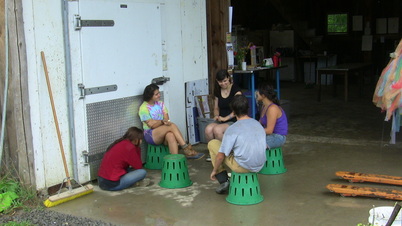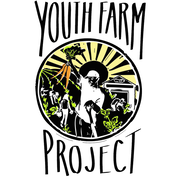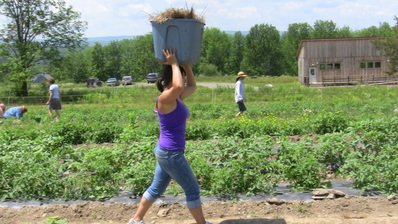 Willow gives straight talk to her crew. Willow gives straight talk to her crew. I applied for a job via the Youth Employment Service just looking for something to do and make some extra cash during the summer. I picked the Youth Farm Project as my first choice because I always enjoyed gardening and outdoor work. But what I didn’t know was that this wasn’t just going to be a boring summer job. I came into the Youth Farm Project not knowing anything about it. Not knowing that it was about community, food justice education, and a very rewarding summer of hard work and fun. Before the Youth Farm Project my experience with farms had been minimal. I lived in New York City for sixteen years and so when I moved to Ithaca, seeing all the farms everywhere was almost a magical sight. But I wasn’t just a pure city kid. My grandfather who lives in Amherst, MA in the woods in the middle of nowhere always fascinates me by his knowledge of the nature and the land he lives on. He is not a farmer but he knows everything there is to know about the trees and plants and wildlife that live around him. And in the same way, farmers like Ann and Joseph know so much about their farmland and the weeds and crops that they grow. There are many aspects to the Youth Farm Project. The most important one is actually learning about the basics of farming and what jobs are required to maintain a healthy and successful farm. The daily life on the farm consisted of tasks of all sorts ranging from weeding, harvesting crops, mulching beds, putting up fences, trellising tomatoes, feeding the chickens, setting up irrigation systems, transplanting and much more. Tasks that would ordinarily seem boring or repetitive become fun and the time flies when you’re laughing with your crew and making endless farming puns. The hidden aspects of farming- and food are easily overlooked, and the Youth Farm Project does a superb job of making its workers aware of these issues. Every Wednesday, instead of working in the fields, the Youth Farm Project gets together at ACS (the alternative high school in Ithaca) and discusses food justice issues and the economics of sustainable agriculture. In the afternoons a chef comes in and helps the Youth Farm Project cook up a healthy, fantastic meal using crops harvested from the farm. For me, Wednesdays were the days that really put our hard work into perspective and gave it genuine meaning. The third thing that the Youth Farm Project gave to me was growth. Not just growth of newly transplanted, but growth as a person. I was one of the co-crew leaders of my group and this position really helped me advance my leadership skills and bring out my confidence. But more importantly, I didn’t feel like was working above or under anyone, everyone was on the same page and the environment was so friendly and welcoming. Farming no longer became some abstract imagine of a man in denim overalls driving a tractor, it became a group of friends and laughter and hard work. It became personal. It became the reward of not just hard work, but meaningful work and a great learning experience. By Willow Hunt, Summer 2013 Crew Leader Comments are closed.
|
Archives
August 2022
Categories |
The Youth Farm Project | 24 Nelson Road, Ithaca, NY 14850 | [email protected]


 RSS Feed
RSS Feed